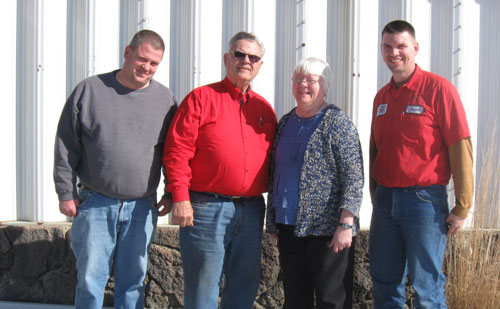2017 Sustainability Business of the Year

Chad Eisenmenger, manager, West Point Implement; Erv Eisenmenger, Elaine Eisenmenger, and Scott Eisenmenger, manager, West Point Design
Finding ways to repurpose materials “is something we love to do” at West Point Design, Inc., says Erv Eisenmenger, owner of the company that produces Spread-All Manure Spreaders, considered to be the gold standard for heavy-duty industrial manure spreaders.
“The U.S. wastes a lot of natural resources when another use can be found for so much of it,” says Eisenmenger, who operates the West Point business, along with West Point Implement, with his sons, Scott and Chad.
Eisenmenger first became acquainted with the Nebraska Business Development Center (NBDC) through its consultant at the office at Wayne State College, Loren Kucera. “Loren was a customer of ours back when he farmed with his dad,” Eisenmenger says. “After Loren went to work in Wayne at the college, we got advice on several issues over the years. He always has good, sound direction and information to pass along.”
He says Kucera and the NBDC have also conducted training workshops at the West Point manufacturing plant. “In business today, it takes a lot of input to keep on track,” he says. “We’ve been blessed to have sources like Loren and the NBDC.”
West Point Design was founded in 1993 when another company that we represented left the spreader business. The Spread-All Manure Spreader was the first product designed and built West Point Design, and it continues to be the main product marketed within a region stretching from the Dakotas south to Texas.
Since developing the spreader, Eisenmenger has designed, manufactured and marketed 10 products under the West Point Design tradename. Two of the products are no longer in production.
The company employs a total of 95 people at its manufacturing facility and at the implement dealerships in West Point, Columbus, Neb., and Missouri Valley, Iowa, Eisenmenger says.
There are five models of the Spread-All and each incorporates as much repurposed material as possible, including former military tires, rear-axles from semi-trailers, repurposed chisel teeth in the distributors, and the floor and sides that are made from composite material recycled from plastic bottles and other plastic items.
“The composite material is much better than steel or wood because it doesn’t deteriorate from the acids in manure,” he says. “It costs more, but it lasts longer.”
West Point Design also markets the Shade-All, a 30-foot-by-30-foot cover used in feedlots for up to 75 mature cattle to protect them from heat and high humidity. The Shade-All has also been used for shade by people at county fairs and concerts, Eisenmenger says. Repurposed tractor tires are filled with cement to act as the Shade-All base, and repurposed steel tubes are incorporated as supports.
Another product, the Fence-All, is a portable cattle panel that can be moved with a loader or forklift and reused in several locations. It, too, incorporates recycled metal tubing.
“What some people consider waste, we consider opportunity,” Eisenmenger says. “Military tires, for example, are superior to an ag tire and the military rotates them by age, not use. Some of the tires we get have never even been mounted. It would be a waste not to use them.”
Ensuring his customers are productive and profitable has been a key element of success, Eisenmenger says. “You have to make sure you’re helping them,” he says, “not just living off of them.”